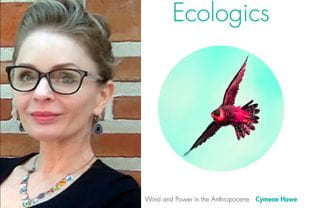Sustainable energy solutions like the development of wind farms are being explored around the world. But what is the social impact of this shift from fossil fuels to wind power?
Ecologics (Duke University Press, 272 pages, $25.95), a new book from Cymene Howe, an associate professor of anthropology at Rice University, explores that question. Howe’s book is part of a duograph — two books by different authors that draw on shared research and fieldwork — written with her research partner, Rice professor of anthropology Dominic Boyer.
Howe’s book recounts her fieldwork with Boyer in Mexico’s Isthmus of Tehuantepec, where she tracked the development of what would have been Latin America’s largest wind park, Mareña Renovables. She explored how this new, more sustainable form of energy impacted the lives of the people living in the area, and specifically documented how indigenous people resisted the project. She also focused on the political and corporate factors that ultimately derailed its renewable energy potential.
“There are two challenges of energy transition now,” Howe said. “One is that we need to implement transition quickly — especially given the recent IPCC reports showing how little time we have to cut our greenhouse gas emissions drastically. Two, it is critical that renewable energy projects like the wind farms I studied in Mexico be developed in a way that takes local concerns into account. This means corporate, state and community partners need to be in real dialogue with each other; mutual respect needs to be central. Otherwise, we miss an opportunity to transform many historically unequal relationships between energy developers and the communities they affect.”
Howe hopes the book will shed light on the social complexities of exploring more sustainable energy options.
“Implementing new energy infrastructures means pursuing an ethos of rehabilitation rather than resource extraction,” she said. “We need to rebalance human demands for energy with the environmental impacts they have historically created. With energy transition, we have an incredible, unique opportunity to do energy right — and to do it in a way that is more equitable to all.”
For information on the book, visit https://www.dukeupress.edu/ecologics.


